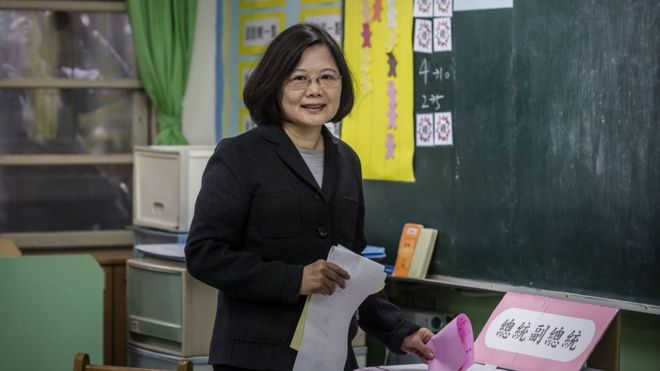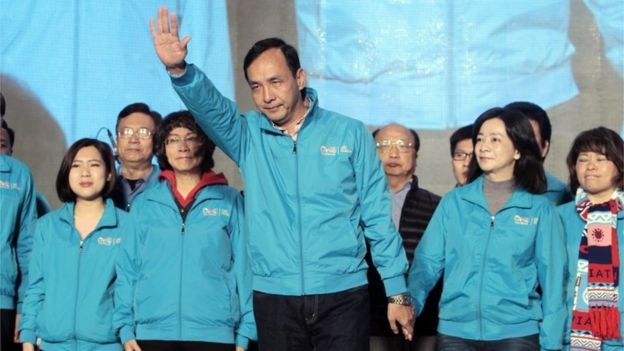
Ms Tsai, 59, leads the Democratic Progressive Party (DPP) that wants independence from China.
In her victory speech, she vowed to preserve the status quo in relations with China, adding Beijing must respect Taiwan's democracy and both sides must ensure there are no provocations.
China sees the island as a breakaway province - which it has threatened to take back by force if necessary.
In her speech, Ms Tsai hailed a "new era" in Taiwan and pledged to co-operate with other political parties on major issues.
The will of the Taiwanese people would be the basis for relations with China's Ms Tsai said, urging both sides to show "dignity and reciprocity" in their relations.
She thanked the US and Japan for their support and vowed Taiwan would contribute to peace and stability in the region.
Ms Tsai had a commanding lead in the vote count when Eric Chu of the ruling Kuomintang (KMT) admitted defeat.
Mr Chu congratulated Tsai Ing-wen and announced he was quitting as KMT head. Taiwan's Premier Mao Chi-kuo also resigned.
Read more about Taiwan's election

Why does this election matter?
Who is running?
Is it all about the economy?
What's behind the China-Taiwan divide?
Taiwan profile
The election came just months after a historic meeting between the leaders of Taiwan and China.
However, the flagging economy as well as Taiwan's relationship with China both played a role in the voters' choice, correspondents say.
The KMT has been in power for most of the past 70 years and has overseen improved relations with Beijing - Ms Tsai's victory means this is only the second-ever victory for the DPP.
The first was by pro-independence advocate Chen Shui-bian - during his time as president between 2000 and 2008 tensions escalated with China.
Analysis: Cindy Sui, BBC News, Taipei
The election result marks a turning point in Taiwan's democracy and relationship with China.
The DPP win means the island is moving towards a political system in which voters prefer to transfer power from one party to another, ending decades of mostly KMT rule.
That could make relations with China uncertain, because unlike the KMT, the DPP favours Taiwan's independence and does not recognise the Republic of China (Taiwan's official name) and the People's Republic of China as part of "one China".
The KMT was the Communists' bitter enemy during the civil war. It fled to Taiwan after losing the civil war and its charter and leaders still favour eventual unification. It remains China's best hope - and perhaps only hope - of peacefully reunifying with Taiwan
Beijing has been closely watching the elections to gauge Taiwanese people's sentiments and what those sentiments will mean for its goal of reunifying with the last inhabited territory - following Hong Kong and Macau - that it feels was unfairly snatched from it by Japan as a colony in 1895, and then ruled separately by the KMT after the civil war.
Ms Tsai, a former scholar, has said she wants to "maintain [the] status quo" with China.
She became chairwoman of the DPP in 2008, after it saw a string of corruption scandals.
She lost a presidential bid in 2012 but has subsequently led the party to regional election victories. She has won increased support from the public partly because of widespread dissatisfaction over the KMT and President Ma Ying-jeou's handling of the economy and widening wealth gap.

Eric Chu's loss shows the KMT is losing the nearly 70-year monopoly on power
Saturday's polls come after a historic meeting between President Ma and Chinese President Xi Jinping in Singapore in November for talks that were seen as largely symbolic - the first in more than 60 years.
Eric Chu, 54, is the mayor of New Taipei City and stepped up to become chairman of the party in October.
The KMT is at risk of losing its majority in the legislature for the first time in history.
The former accounting professor was seen as popular with young people in the party, but had been unable to change public opinion that is increasingly unhappy with the party's friendly stance towards China and the island's economic travails.
In 2014, hundreds of students occupied the parliament in the largest show of anti-Chinese sentiment on the island for years. Labelled the Sunflower Movement, protesters demanded more transparency in trade pacts negotiated with China.
Taiwan for all practical purposes been independent since the end of the Chinese civil war in 1949, when the defeated Nationalist government fled to the island as the Communists, under Mao Zedong, swept to power.
Republic of China (ROC)
Capital: Taipei
-
Population 23,3 million
-
Area 36,188 sq km (13,972 sq miles)
-
Major languages Mandarin Chinese (official), Min Nan Chinese (Taiwanese), Hakka
-
Major religions Taoism, Buddhism, Christianity
-
Life expectancy 76,2 years (men), 82,7 years (women)
-
Currency New Taiwan dollar


0 comments:
Post a Comment